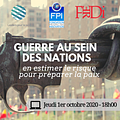The Line and the Territory: modelling fragile border zones in the Sahel for a more inclusive border security management
October 09, 2025







FERDI is developing an IT programme concerning IDPs in the Central African Republic for the World Bank. Sosso Feindouno, FERDI Research Fellow, received the World Bank Group's DEC VPU Team Awards for FY21 (2021).
Security Expenditure and its Crowding-Out Effects on Development Financing in G5 Sahel Member Countries
The study is structured into five complementary sections:

.jpg)



